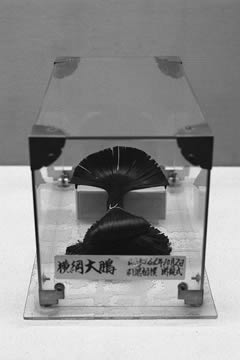The Greatest Ever? cont. |

yokozuna (21, since broken by a month by Kitanoumi).The Twilight and Personal DifficultiesAs they do, age and injuries eventually took their toll. Taiho's last match came on the 5th day of the 1971 Natsu Basho, where he faced Komusubi Takanohana, later to become ozeki, and father of the dai-yokozuna Takanohana. |
|

the standard was the legendary Futabayama's 12 yusho (won in an era of two basho per year). Taiho blew past that in just 2 1/2 years, and it quickly became clear that he was only getting started. In the period from September 1964 to January 1967 Taiho would double Futabayama's record, bringing his total to 24. During that time, he won 6 consecutive yusho - records in themselves - on two separate occasions While the train slowed down a little after that, he continued on, winning occasionally, and taking his 32nd and final tourney title in the 1971 Hatsu Basho. His record has been challenged by three later dai-yokozuna - Kitanoumi (24), Chiyonofuji (31) and Takanohana (22) - but has yet to be broken.So dominant was he that, as one friend who saw him in his prime related, "Even if we didn't see it, we always knew the result - Taiho won." Unlike in some later eras though, this dominance did not seem to damage his popularity. As a common saying of the day went - "Kyojin, Taiho, Tamagoyaki" - the three things that all Japanese (supposedly) loved. "Kyojin" refers to the |
Tokyo-based Yomiuri Giants baseball team; "tamagoyaki" is a type of fried-egg sushi.Among other records Taiho set were the highest career winning percentage in makuuchi (.838), most wins in makuuchi (746, since surpassed by Kitanoumi's 804 and Chiyonofuji's 807), most wins in a single year (81, since broken by Kitanoumi's 82) most zensho yusho (8), and youngest |
|

|
||

